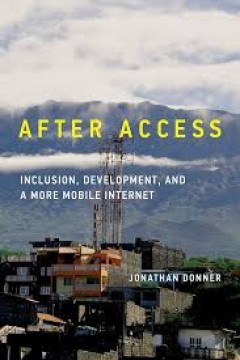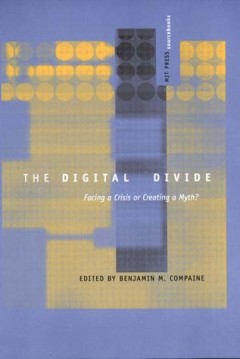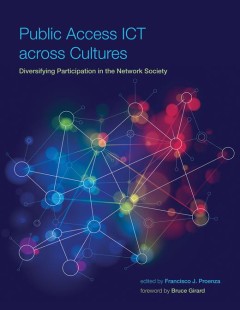Filter by

After access : inclusion, development, and a more mobile Internet
"Almost anyone with a $40 mobile phone and a nearby cell tower can get online with an ease unimaginable just twenty years ago. An optimistic narrative has proclaimed the mobile phone as the device that will finally close the digital divide. Yet access and effective use are not the same thing, and the digital world does not run on mobile handsets alone. In After Access, Jonathan Donner examines …
- Edition
- -
- ISBN/ISSN
- 9780262331258
- Collation
- 1 online resource (x, 295 pages) :illustrations.
- Series Title
- -
- Call Number
- -

The Digital Divide: Facing a Crisis or Creating a Myth?
Annotation The Digital Divide refers to the perceived gap between those who have access to the latest information technologies and those who do not. If we are indeed in an Information Age, then not having access to this information is an economic and social handicap. Some people consider the Digital Divide to be a national crisis, while others consider it an over-hyped nonissue. This book prese…
- Edition
- -
- ISBN/ISSN
- 9780262287029
- Collation
- -
- Series Title
- -
- Call Number
- -

Public access ICT across cultures : diversifying participation in the network…
Shared public access to computers and the Internet in developing countries is often hailed as an effective, low-cost way to share the benefits of digital technology. Yet research on the economic and social effects of public access to computers is lacking. This volume offers the first systematic assessment of the impact of shared public access in the developing world, with findings from ten coun…
- Edition
- -
- ISBN/ISSN
- 9780262328548
- Collation
- 1 online resource (xiv, 476 pages)
- Series Title
- -
- Call Number
- -

Connected in isolation :digital privilege in unsettled times
"A leading researcher explores digital disparity and the pandemic and asks: how did people of different backgrounds use digital media to negotiate the challenges of isolation, unemployment, home schooling, remote work, and COVID-19 itself? And how did digital technology intersect with existing social and economic disparities? Although it is undeniable that technologies helped facilitate numerou…
- Edition
- -
- ISBN/ISSN
- 9780262371506
- Collation
- 1 online resource
- Series Title
- -
- Call Number
- -

Technology of the oppressed :inequity and the digital mundane in favelas of B…
"A look at the role technology (ICTs) plays in the lives of Brazilian favela dwellers, which the author explores through his own notion of "mundane technologies""--OCLC-licensed vendor bibliographic record.
- Edition
- -
- ISBN/ISSN
- 9780262368636
- Collation
- 1 online resource.
- Series Title
- -
- Call Number
- -

Farm fresh broadband :the politics of rural connectivity
"This study of the political economy of rural broadband combines critical policy analysis with stories of rural Americans and offers solutions for solving the rural-urban digital divide"--OCLC-licensed vendor bibliographic record.
- Edition
- -
- ISBN/ISSN
- 0262367076
- Collation
- 1 online resource.
- Series Title
- -
- Call Number
- -

The promise of access :technology, inequality, and the political economy of h…
"Based on fieldwork at three distinct sites in Washington, DC, this book finds that the persistent problem of poverty is often framed as a problem of technology"--OCLC-licensed vendor bibliographic record.
- Edition
- -
- ISBN/ISSN
- 0262363348
- Collation
- 1 online resource.
- Series Title
- -
- Call Number
- -

Universal access and its asymmetries :the untold story of the last 200 years
"The pandemic has raised awareness of the need for universal access to high speed internet service in the United States. This book shows us that the debate about internet access is but the latest chapter in a long history of debates about universal service in the United States. This book analyzes the history, costs, and benefits of providing universal access to technologies and services, includ…
- Edition
- -
- ISBN/ISSN
- 9780262372985
- Collation
- 1 online resource.
- Series Title
- -
- Call Number
- -

Networking peripheries :technological futures and the myth of digital univers…
In Networking Peripheries, Anita Chan shows how digital cultures flourish beyond Silicon Valley and other celebrated centers of technological innovation and entrepreneurship. The evolving digital cultures in the Global South vividly demonstrate that there are more ways than one to imagine what digital practice and global connection could look like. To explore these alternative developments, Cha…
- Edition
- -
- ISBN/ISSN
- 0262319527
- Collation
- 1 online resource (xxvii, 258 pages) :illustrations
- Series Title
- -
- Call Number
- -

Social consequences of Internet use :access, involvement, and interaction
Drawing on nationally representative telephone surveys conducted from 1995 to 2000, James Katz and Ronald Rice offer a rich and nuanced picture of Internet use in America. Using quantitative data, as well as case studies of Web sites, they explore the impact of the Internet on society from three perspectives: access to Internet technology (the digital divide), involvement with groups and commun…
- Edition
- -
- ISBN/ISSN
- 9780262256506
- Collation
- 1 online resource (xxiv, 460 pages)
- Series Title
- -
- Call Number
- -
 Computer Science, Information & General Works
Computer Science, Information & General Works  Philosophy & Psychology
Philosophy & Psychology  Religion
Religion  Social Sciences
Social Sciences  Language
Language  Pure Science
Pure Science  Applied Sciences
Applied Sciences  Art & Recreation
Art & Recreation  Literature
Literature  History & Geography
History & Geography